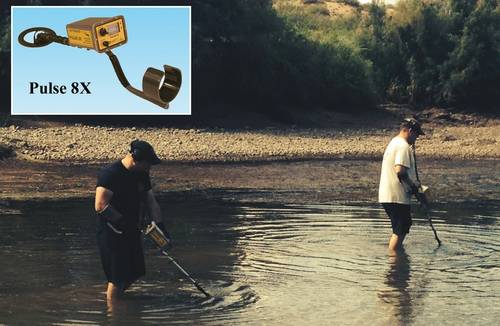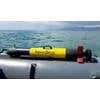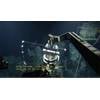JW Fishers Pulse 8X has been rated the best underwater metal detector by the U.S. Department of Homeland Security’s SAVER program. The System Assessment and Validation for Emergency Responders (SAVER) program was established to assist emergency responders making procurement decisions. Located within the DHS Science and Technology Directorate, the SAVER Program conducts objective assessments and validations on commercial equipment and systems and provides those results along with other relevant equipment information to the emergency responder community. In a comparison of the eight top underwater detectors on the market, Fishers Pulse 8X was rated number one.
The tools law enforcement agencies use to investigate crimes and ensure public safety are critical to their success. Police departments and sheriff’s offices around the country are adding underwater metal detectors to ensure their dive teams have the right equipment to effectively do their job. An essential tool for locating evidence disposed of in a waterway, metal detectors routinely assist public safety divers in finding weapons, shell casings, stolen objects and explosive devices.
One agency having success with the underwater metal detector is the New Mexico State Police. The NMSP Search and Recovery Dive Team was established in 1963 in response to increasing demands for law enforcement divers to respond to drownings and underwater recovery of property and evidence. The team currently consists of nineteen officers stationed throughout the state. Although most people think of New Mexico as a desert state, within its borders are numerous recreational waterways as well as thousands of miles of irrigation and drainage canals. Recently the team was called out to find a weapon used in homicide and thrown into the Rio Grande River. Dive team member Sgt. Ryan Carr reported, “We used three of our Pulse 8X detectors in the search that day, and located the gun in less than an hour.” NMSP retired captain and former dive team commander Mike Waring said, “If we’re looking for a weapon, we know the Pulse 8X will find it.”
Underwater metal detectors are so effective, and their use has become so widespread, that agencies training public safety divers are developing courses on how to best utilize these devices. One is the Underwater Crime Scene Investigation team at Florida State University. They developed a program that provides advanced training in crime scene investigation for aquatic environments. The focus is on operational techniques and protocols available to the underwater investigator. Students learn how to use a variety of the high tech tools including Fishers Diver Mag magnetometer and Pulse 8X detector to locate weapons and explosive devices.
Other organizations training public safety divers in aquatic crime scene investigation are Dive Rescue International in Colorado and Team Lifeguard Systems in New York. Both offer courses in aquatic preparedness to ensure public safety dive team respond effectively to water incident scenes. Their instructors combine knowledge of rescue and recovery with experience in the use of state of the art equipment. Their field exercises are designed to help teams establish operational standards that ensure sustainable performance. The detectors they use in their evidence recovery training are JW Fishers Pulse 8X.
The Explosive Training Branch of the Bureau of Alcohol, Tobacco, and Firearms also conducts programs for local, state, and federal law enforcement agencies. They teach identification and location of explosives, and how to properly handle and dispose of them. With the threat of a terrorist attack on any front, officers need to know how to search for and locate explosives that may be attached to ships, bridges, piers, or other underwater structures. The detector ATF is employing in their program is the Pulse 8X.
A few of the many other teams using Fishers detectors are the Federal Bureau of Investigation (FBI) dive teams, the U.S. Navy’s Mobile Diving & Salvage Units, U.S. Coast Guard, U.S. Border Patrol, Massachusetts and New York State Police, Oklahoma Highway Patrol, Placer County Sheriff’s Office and Los Angeles Port Police in Calif., North Carolina Justice Academy, Jackson County Dive Unit in Wisc., Miramar Police in Fla., Colorado Springs Fire Department, Missouri State Highway Patrol, Laredo Fire Department and Wichita Falls Police in Texas, New Jersey State Police, National Police Dive Squad in New Zealand, Swedish Coast Guard, Japan’s National Police Agency and Royal Canadian Mounted Police.
















 December 2025
December 2025



